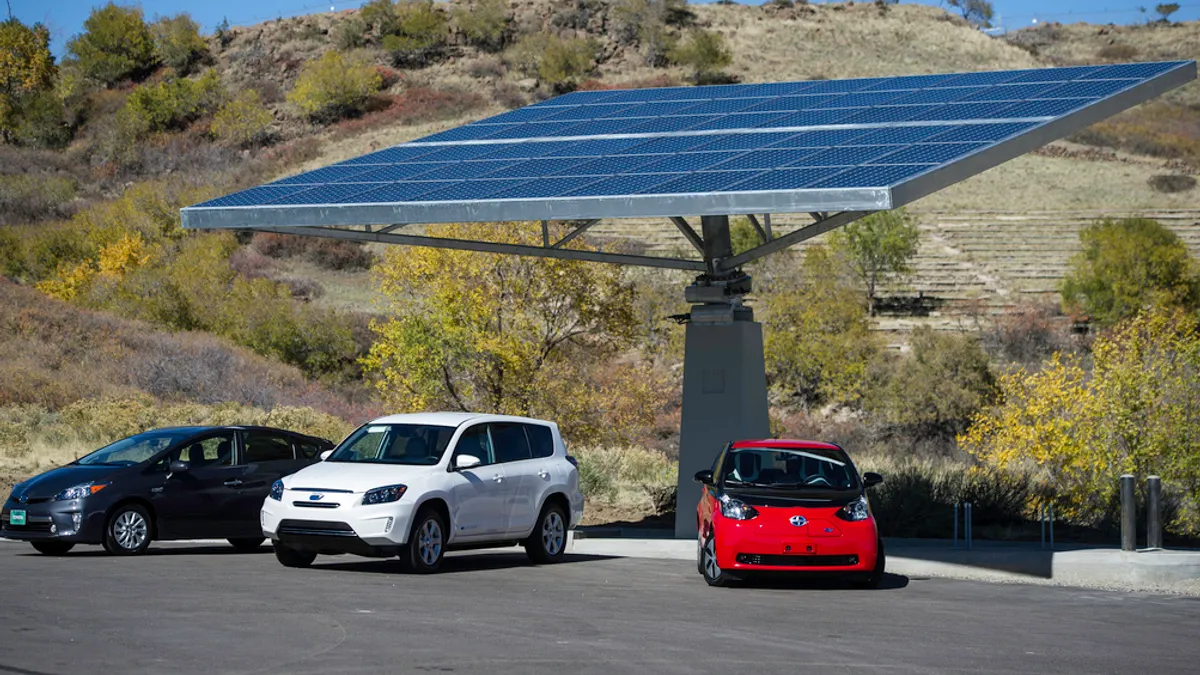Dive Brief:
- The Public Utility Commission of Texas will tackle the question of whether vertically-integrated utilities should be allowed to own electric vehicle charging facilities or other transportation electrification equipment, regulators said at a Thursday open meeting.
- The issue will be considered as part of an Entergy Texas rate case, in which the utility has proposed a rider allowing it to “partner with interested nonresidential customers to plan, construct, own, operate, and maintain” EV charging infrastructure and equipment.
- Commissioners said the question of utility involvement in EV charging is particularly important given billions in incentives being disbursed by the U.S. Department of Energy to develop a national charging network. Texas could receive up to $408 million over five years through the Biden administration’s National Electric Vehicle Infrastructure formula program.
Dive Insight:
Entergy wants to increase its retail base rates, excluding fuel, by 11.2% on average across all customer classes. The PUCT on Thursday approved a preliminary order in the case, laying out dozens of issues that will need to be addressed during the proceeding.
The question of EV charging station ownership was not originally included, but Commissioner Jimmy Glotfelty said it will be important as more vehicles and infrastructure “proliferate in our communities.”
“Is it appropriate for an electric utility in a vertically-integrated area to own vehicle charging facilities or other transportation electrification and charging infrastructure? Or should the ownership of such facilities be left to competitive providers?” he asked during the meeting.
PUCT Chairman Peter Lake noted the potential for subsidies from the DOE, “which would speak very much towards a competitive construct, rather than a monopoly construct.”
The Biden administration is preparing to send $5 billion to states to support the installation of 500,000 charging stations
Commissioner Lori Cobos said the PUCT would need to “take into consideration the impacts of DOE funding that can be obtained by these electric utilities, and how that should be, maybe, trued-up in future rate cases.”
Observers say it is too soon to tell exactly what Entergy has in mind. The scope of the utility’s EV charging station ownership plans are not clear from its application.
In a statement to Utility Dive, Entergy Texas said it has "proposed an innovative solution to address commercial customer feedback associated with the purchase and installation of transportation electrification infrastructure and equipment, such as upfront costs, technical expertise, and maintenance.
“To help meet our customers’ electrification needs, we will partner with equipment manufacturers’ and third party installers to help plan and install transportation electrification infrastructure and equipment, which may or may not include the charging equipment itself. Our proposal offers participating non-residential customers the flexibility to choose their desired level of transportation electrification infrastructure and equipment, as well as utility involvement.
“More specifically, the offer involves a non-residential customer (retail store, school, hospital, multi-family housing, etc.) having Entergy Texas install, own and maintain EV charging infrastructure on the customer’s property; the offer includes an option where the customer can own and maintain the charger if they so choose. The customer also determines the type of EV charger and its features as well as who will have access to use the EV charger (the customer’s employees, tenants, visitors, etc.) and whether or not users of the equipment have to pay the customer.
“In return for having the EV charger and related equipment on their property for their use, the customer will pay a fixed amount to Entergy Texas on their electric bill for up to 10 years,” Entergy Texas said.
Retailers, including gas station and convenience store owners, have warned that the ability of regulated utilities to own charging facilities in some states will keep private investment sidelined — and they say they are watching the Texas rate case.
The PUCT’s preliminary order “starts the conversation in Texas about how EV charging stations will fit into the state’s electric market, a marketplace that has long embraced competition,” Charge Ahead Partnership Executive Director Jay Smith said in an email. The group says it represents businesses that want to see a “competitive” EV charging market.
“These policy questions that are being addressed by utility regulators and legislators around the country are important and will ultimately determine how this essential component of the infrastructure of the future will look across Texas and the nation,” Smith said. “We are excited that Texas is joining this conversation and look forward to working with policy leaders. The EV charging marketplace will thrive with the help of private investment.”
Editor’s Note: This story has been updated with additional details from Entergy Texas about its transportation electrification proposal.














